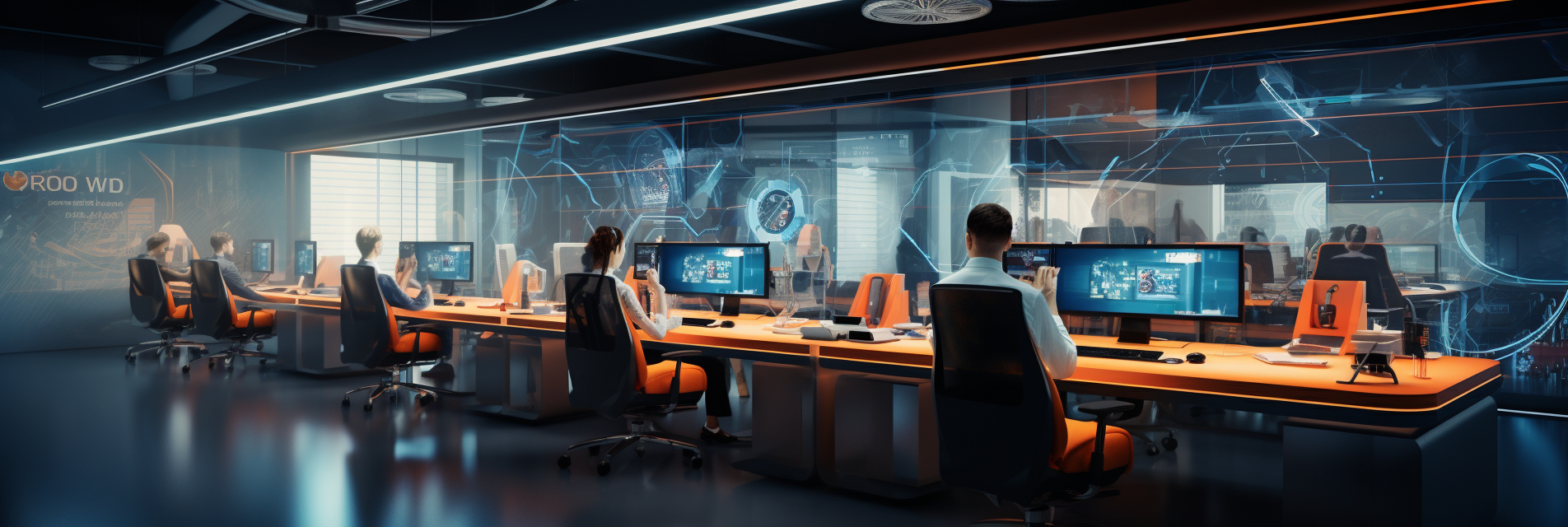
Unlocking the Potential: How AI is Driving the Industry 4.0 Revolution
In today’s rapidly evolving technological landscape, the convergence of artificial intelligence (AI) and Industry 4.0 is giving rise to a transformative revolution. This synergy has the power to reshape industries, redefine processes, and unlock unprecedented opportunities for innovation. In this article, we delve into the profound impact of AI on the Industry 4.0 movement, exploring how this dynamic partnership is propelling us into the future of manufacturing and beyond.
AI’s Role in Industry 4.0 Evolution:
Industry 4.0, often referred to as the Fourth Industrial Revolution, is characterized by the fusion of digital technologies, data analytics, and smart systems within manufacturing and production processes. At the heart of this revolution lies artificial intelligence – the technology that empowers machines to learn, reason, and make decisions. AI’s ability to process vast amounts of data in real-time and generate insights is a cornerstone of Industry 4.0’s transformation.
1. Smart Factories of Tomorrow:
AI-powered smart factories are the embodiment of Industry 4.0’s vision. These factories integrate IoT devices, sensors, and AI-driven analytics to create autonomous and self-optimizing systems. Machines communicate with each other, make real-time adjustments, and anticipate maintenance needs, thereby minimizing downtime and maximizing efficiency. AI-driven predictive maintenance ensures that equipment issues are addressed before they impact production, leading to significant cost savings.
2. Enhancing Efficiency through Automation:
Automation lies at the heart of Industry 4.0, and AI takes it a step further. Intelligent robots equipped with AI can handle complex tasks with precision, adapt to variations, and collaborate seamlessly with human workers. This not only accelerates production processes but also improves quality control and workplace safety.
3. Data-Driven Decision Making:
The Industry 4.0 ecosystem generates a staggering volume of data. AI’s data analytics capabilities allow businesses to turn this data into actionable insights. Manufacturers can make informed decisions about production, supply chain optimization, and resource allocation. Real-time data analysis helps in identifying trends, patterns, and anomalies, enabling proactive decision-making.
4. Transforming Supply Chain Management:
AI-driven supply chain management is a game-changer within Industry 4.0. Predictive analytics enable accurate demand forecasting, reducing inventory costs and waste. Additionally, AI optimizes routing, scheduling, and logistics, ensuring timely delivery and minimizing transportation expenses.
5. Personalized Customer Experiences:
AI is reshaping the way businesses interact with customers in the Industry 4.0 landscape. Through advanced AI algorithms, companies can analyze customer data to understand preferences, behaviors, and buying patterns. This information enables personalized product recommendations, targeted marketing campaigns, and tailored services, enhancing customer satisfaction and loyalty.
6. Collaborative Robots (Cobots):
Cobots are a prime example of AI’s influence on Industry 4.0. These robots are designed to work alongside humans, enhancing productivity and safety. AI-enabled cobots have the intelligence to recognize human movements, ensuring safe interactions and enabling seamless collaboration on tasks that require precision and dexterity.
7. Innovation and Product Development:
In the context of Industry 4.0, AI fosters innovation in product development. Virtual simulations and AI-driven design tools enable engineers and designers to create and iterate product prototypes quickly. This accelerates the innovation cycle, reduces time-to-market, and allows for the creation of cutting-edge products that meet consumer needs.
8. Remote Monitoring and Maintenance:
AI-powered IoT devices facilitate remote monitoring and maintenance of equipment and assets. Real-time data feeds enable technicians to identify potential issues, diagnose problems, and perform maintenance activities from a distance. This not only saves time and costs but also minimizes the need for on-site interventions.
As AI continues to weave itself into the fabric of Industry 4.0, its transformative impact becomes increasingly apparent. From smart factories and efficient production processes to personalized customer experiences and sustainable practices, AI’s role is instrumental in driving the evolution of industries. Embracing AI within the context of Industry 4.0 isn’t just a technological advancement; it’s a strategic imperative that empowers businesses to thrive in a world defined by innovation, efficiency, and adaptability.
As we stand at the crossroads of AI and Industry 4.0, it’s evident that their partnership is propelling us towards a new era of manufacturing and beyond. AI’s ability to drive automation, optimize processes, and enable data-driven decision-making is revolutionizing industries and redefining our understanding of efficiency and innovation. By harnessing the potential of AI within the Industry 4.0 framework, businesses can unlock a future where smart factories, intelligent systems, and data-driven insights lead the way to unparalleled success.
FAQ Section
Q. How does AI contribute to Industry 4.0’s evolution?
A. AI enhances automation, data analysis, and decision-making, powering smarter processes and driving Industry 4.0 transformation.
Q. What role does AI play in optimizing manufacturing efficiency?
A. AI-powered systems enable predictive maintenance, adaptive production, and real-time data analysis for streamlined manufacturing processes.
Q. Can AI enhance customer experiences within Industry 4.0?
A. Yes, AI personalizes interactions, recommends products, and tailors services, enhancing customer satisfaction and engagement.
Q. How does AI impact sustainability in Industry 4.0?
A. AI optimizes energy consumption, reduces waste, and promotes sustainable practices, contributing to a greener and more efficient industrial landscape.
Liked this blog? Sign up for our exclusive AI monthly newsletter.
Previous articles

AI 2024: Predictions and Advances in Artificial Intelligence
There’s no doubt 2023 was a landmark year for AI technologies. From healthcare to customer service and beyond, AI transformed the way the average person communicates, works, and solves complex problems. In this article, we’ll delve into the advances and breakthroughs achieved in AI development, as well as the opportunities and challenges that lie ahead […]

AI Call Centers: Turning Customer Support into Customer Experience
When a customer contacts an AI-enabled call center, two things can happen: The customer leaves satisfied with the interaction Their issue is not resolved and they leave with a negative association of your brand Keeping customers satisfied relies on the appropriate use of AI in call centers. This often means centering AI automation as a […]